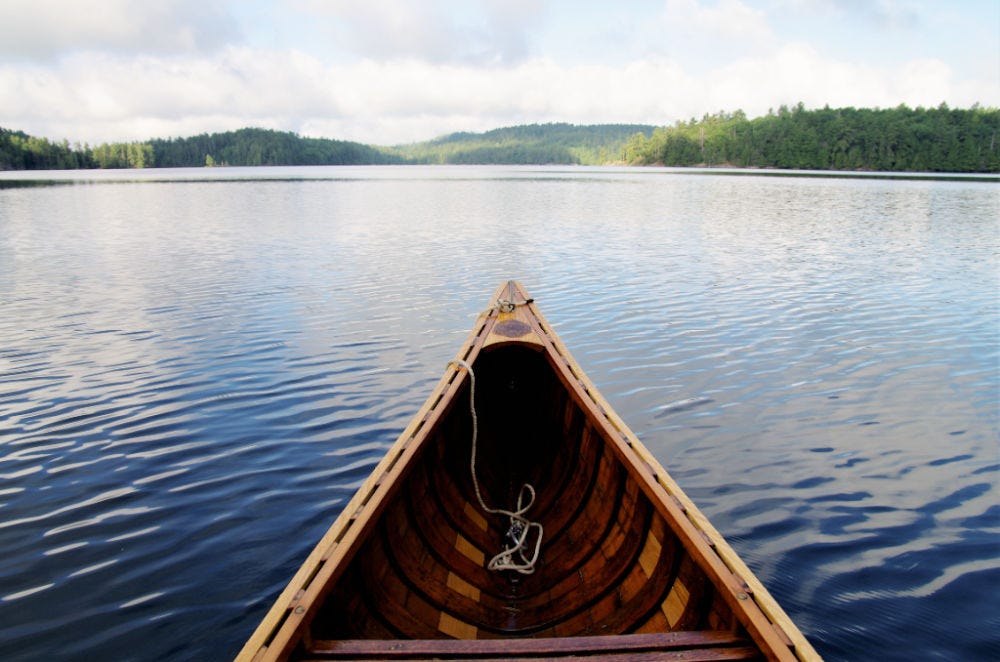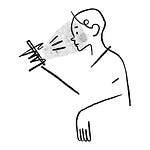The pace at which we approach life matters. Sometimes, a type-a, guns-a-blazin’ posture works in the moment — but then we end up missing things we otherwise wouldn’t see.
Seth: Website | Newsletter | Twitter | Instagram
Tsh: Website | Newsletter | Twitter | Instagram
All the Light We Cannot See, by Anthony Doerr
The Seven Story Mountain, by Thomas Merton
The Practice, by Seth Godin
Scroll down for the transcript.
Tsh: This is A Drink with a Friend. I'm Tsh Oxenreider.
Seth: And I'm Seth Haines.
Tsh: So I'm taking my daily walk right now with my dog, Ginny and I do one everyday, either the morning or the afternoon, right now it's a little afternoon. Our neighborhood is a great place to walk. We live in a very historic walkable neighborhood right off a town square. I'm just a few houses away from our house and yet I'm already almost at the new whiskey bar and the pizza place, and just a few blocks away from the library and a toy store selling classic toys and clothing shops and all the things. I'm going on my walk. And I'm looking at my dog who is enjoying and living her best life, just smelling everything. She is smelling every single leaf, every single rock, I'm having to pull her away from the things just so she doesn't spend all our walking time smelling everything. I guess the thing that I'm struck by right now as I'm watching her and going on this walk is the uselessness of this walk. Like really? I'm not going anywhere. I am going on a walk with my dog. I am taking her out because dogs need walking. And quite frankly, I need walking too. That's it. We're not accomplishing anything. I'm not going to the library to return books. I'm not going to the coffee shop to get a coffee. I'm not picking up one of our pizza orders. I am just going on a walk. We're going to loop around the courthouse on the town square and then come back home and move on with our day. I think I'm just weirdly struck with the idea of doing something slowly, such as walking for the sake of itself. It is the end. It's not a means to an end. I'm not going anywhere and I'm not going on a drive. There are times when going on a drive is great, but right now I'm going on a walk. It's much slower. I'm not going as far. You could say it's a very analog mode of transportation, right? It’s like the most tool for you way to get around and I'm doing it just because, and there's just something really needful about this in our lives that I think we forget. By me going really slow, literally stopping right now because Ginny is smelling a bush. I get to notice things. I am noticing that there are birds out. It's 72 degrees here in central Texas in January. I am noticing that this woman in front of me has a really cool shirt. I wouldn't have seen that if I were just driving by. I'm noticing the interesting crossover between Christmas decorations still up in the square and it looks like they're starting to take them down. It's just kind of that halfway. It is the holidays and it's not, that I can see. There are people sitting around on benches talking about who knows what, right? It's way less crowded because it's after Christmas. I guess I'm just thinking about how going on walks to nowhere are good in and of themselves. Not because they accomplish anything in our lives and going on a walk as opposed to driving somewhere is good because it forces us to slow down and notice things we wouldn't otherwise notice. That's really cool. I need to do that more often, I think.
Seth, what are you drinking?
Seth: Today, I am drinking coffee from a local roaster called Airship Coffee. It's a good friend of mine named Mark Bray, does amazing work. It's an Ethiopian and it is blueberries for days, blueberries and a little bit of chocolate too, but it's really nice blend. I'm enjoying it. It's cold outside. It's late in the day. I need some coffee.
Tsh: Is it Yirgacheffe?
Seth: He actually doesn't disclose it, but it's gotta be, it's gotta be, it just says Ethiopian on the backside of the package, but it's gotta be Yirgacheffe. That's what I'm drinking. What are you drinking?
Tsh: I am drinking my go-to. This is almost like my black tea, but in the cold weather and it's called Harvest Blend from Trader Joe's, but we call it Foxy tea because it's a yellow box with a fox on it and you can only get it for like two months there and so I stock up. I literally have like a dozen boxes in the closet and it's not because this is fancy tea. I think it's like two bucks a box. I just like it because it's one of the only, it's caffeine free, which I actually need right now because I can't drink caffeine this late in the day. I'm impressed you can.
Seth: It’s one of my crowning achievements in life is that I can drink caffeine after 3:00.
Tsh: Yeah. That is impressive at our age.
Seth: What’s the flavor profile of the tea that you're drinking?
Tsh: It is cinnamon cardamom. It's those fall flavors in a way. It tastes like a chai if you know what a spiced chai blend is, but just without the caffeine. And that's what I like because I love chai, but it's loaded with caffeine. So this is my late afternoon chai.
Seth: So you’re rolling spicy.
Tsh: I am, which I know, technically you're not supposed to do that while you're podcasting or talking because cinnamon can mess with your throat but I wanted it anyway. Kyle tolerates it, Tate hates it. Tate is a massive tea drinker. She drinks all kinds of tea all day long because she's like an 85 year old grandma. But she hates this kind of tea. I think I'm the only one in the house that drinks these 12 boxes of tea all year long. And that's fine with me. I'll take it.
Seth: Well, I'll tell you this. You're lucky because you have Trader Joe's. Do you know, in my neck of the woods, we don't even have Trader Joe's. I can get zero things Trader Joe's.
Tsh: That is unfortunate.
Seth: It’s very unfortunate.
Tsh: I love this topic that we're going to talk about today and I love that we're talking about it the time of year we're talking about it. I would even add another layer, in 2021 I'm glad we're talking about it because early January, everyone loves to talk about goals, resolutions, that whole new year, new you category of books come out and it's overwhelming and we can feel all kinds of pressure to hurry up and set goals and make this our best year ever trademark. It just feels overwhelming. I say that as someone who likes goals and needs goals. I imagine for those who aren't into that, it would feel overwhelming. I'm glad we're going to talk about this.
Seth: My favorite thing about this time of year is that you start to see the same old books crop up in January. You always see Greg McKeown, Essentialism always comes up. James Clears’ work always comes up. You always start to talk about Cal Newport. And it's really funny. You can almost just look and see, if you took a snapshot of Facebook and Twitter recommendations for books or book lists from whatever for, on a webpage, you could almost say, oh yeah, it's definitely January because there are the same four names that are there every year. It's pretty hilarious and awesome.
Tsh: When I first read Atomic Habits, it was because I picked it up off the front table at Barnes and Noble back in the day when we could go to bookstores and was like, oh, I had heard of that. But it was like right in front of me. It was like they wanted me to tackle me with Atomic Habits before I could walk through the rest of the store. There's a reason, I think everybody is fresh off of the holidays. We ate our body weight in carbs and sugar and people are feeling some weird guilt about that and so they think, I know better. I'm going to do those things that I know are good for me, and everything's going to be different this year and I'm not trying to be snarky or sarcastic. I'm really not because I get that desire, but we also know how seldom new year's resolutions succeed. I mean, it's almost none, right? Almost nil. There's some kind of discrepancy going on between desire and actuality. I don't know, I think us talking about slowness and our slow approach to this idea, there might be something there in the answer between why it's not working.
Seth: I think a lot of the new year's resolutions and the goal setting and those things, so much of that tends to be impulsive, at least for me. You get to the last couple of days of December and all of a sudden you've got to get out the planner and write down all the new goals for the next year or all the projections, all the targets, all the things you want to change. If you wait until December 29th to think of all the things you want to make different the next year, then really all you're doing is writing down impulsive things that you're sort of disgruntled about or that you wish you could do better. I'm not sure that that's the best way to create goals for the next year or projections for the next year or things you want to change on a whim, impulse. I don't think that's the best way to do it.
Tsh: Right. They're just aspirations and it makes me wonder why we aspire to be, I don't want to say people we're not, but people we know we could be, but aren't in the moment. With us leaning heavily into the sacramentality of life and if by that, we mean the idea of seeing God in all things. If we peel back the layer of that, I think it's an interesting notion this criteria where we just want to better ourselves. I think the key question is to what end? Why do we really want to?
Seth: Yeah, that's right.
Tsh: I think there is something we need to, maybe a thread we need to pull here for a little bit about our human desire to be better people and what that says about our core nature. What are your thoughts?
Seth: 100% to pull that thread. It's funny if you go back and you look at my goals every year, it really is stronger, faster, better. It's always the same three or four goals—stronger, faster, better. That's not necessarily my phrase, but when you think about it, that indicates something that I feel about myself. I am weaker, I'm less fill-in-the-blank than my peers. I'm less good. I need to be better. I want to do things better. I need to be more diligent, holy, it doesn't matter, put the right word in the blank. I think it really does show, at least for me, just sort of the underlying core, not enough-ness that I sense, that I feel on a regular basis. Last year was the first year that I actually made good long-term on, for instance, on my health goal. I did not really set a good health goal in January. I just wrote down, I need to get in shape this year, but it was really the pandemic. So it was three months later that this sort of external force came in and really spurred me to stop and slowly contemplate where I was with my health and what are the things that I wanted to do to be more healthy, to give myself a better shot at fighting off this external threat because of the way that I was, the way I let things go. To me, I think that 1) it bespeaks something of the core nature that I'm innately incapable it seems of doing anything without an external threat, but 2) just the slowness of how the pandemic developed and how it came and how that shaped and changed and modified my goals longterm, and then allowed me to contemplate what that meant and how that should change my life. To me, there was something in that that was stickier than a January 1 goal.
Tsh: Right. Well, and I think by what March 13th or whatever it was that magic date, anything we planned went out the window, no matter who we were really around the world where it's like, well, who knows anything now? I know I had like three or four plane tickets that I had to cancel and I still have not redeemed. I just say that to mean, we're still in that stage, right? We still are in a giant question mark. That's why I think this topic in general being slow about, I don't even know if the word is slow goals because I don't know. I'm workshopping this in my head right now. In 21, we can't plan anything either, yet. It's not to disparage for those of you who might really love the idea of saying by this time, next year I will be X, Y, and Z. I just think 2020 taught us a lot about what we can expect, and that's not much, or what we can predict maybe is the right way to say it. I know in an upcoming episode, maybe the next one, we're going to talk about fitness and what it looks like for us and whatever word we're going to use to talk about taking care of our bodies. But it's a great example of goals because I think so many people have that kind of goal in January. There's something to be said about the idea of looking at it in terms of who do I want to be? What kind of person am I in the midst of a global crisis? Am I going to be a person who is healthy, or am I going to be not a person who is healthy instead of I'm going to run a marathon by June or something, you know?
Seth: Yeah. When you don't know what's even going to be possible in June. I think that was one of the big wake-ups for me last year was if you are engaged in any sort of business and you have any sort of Type A bone in your body, which is laid back, because I like to pretend I am, I do have a Type A bone or three in my body. When you sit down and you write down all these financial goals or these growth goals or these projections, and then you get into the middle of something that is truly this volatile, unpredictable event, you realize that all of the metric goals are meaningless. It's not saying that you don't set metric goals. I'm not saying that, but the goals last year that for me, that really stuck where the goals that were relating to like my states of being, my physical state of being, my emotional state of being, my spiritual state of being. Those were the things that I could actually work on and modify and achieve those goals. Whereas I felt with the metric goals, the financial goals or the growth goals or whatever, I felt like I was just shooting in the dark, like it was the wild west and everybody was shooting everywhere. You almost didn't know even how to focus at times on those goals. I don't know if that was your experience, but that's how it felt to me.
Tsh: Yeah. One of the goals I accomplished that I had wanted to do for years and finally got to do is create a backyard garden that legit actually harvested into some stuff. There've been many years where I've started one and then by June, and just peters out because I just have either lost interest or it got too hot here in Texas. But we had a thriving harvest that we still do actually, right now in January, we can grow year round here in Texas. When I think about that, I think it's because the goal I created was not to yield X amount of tomatoes or be able to can six jars of pickles. It was to be a gardener. It was embodying that identity, and actually James Clear talks about that in Atomic Habits. That the habits that really work are the ones that get into that, he has a concentric circles and the center of that target is who you are, what's your identity. So when you want to become a runner, I guess you translate that into what does it look like on a day-to-day basis? I think that's what we were all given in 2020. We were just given days upon days upon days but not marathons to sign up for. What are you going to do? Are you going to sign up for that race or invest X amount by the end of the year? Or are you just going to be someone who saves every day? And I think that's all we could do, really.
Seth: It's funny that you mentioned gardening because Amber, my wife, she totally, she's always had a good garden, but she totally blew it out this year. I mean, just went all in.
Tsh: She and I talked a lot, this was our common conversation online was showing each other garden pictures like we were old ladies.
Seth: One of the things that I'd always wanted to do and I've done for years off and on was bake. I had baked, I had done sourdough, like it's a longer story, but like four houses ago, which if you knew me is actually not as far back as it seems. But I had done some baking and we had always said when we settle down into our forever home, I'm going to start picking up sourdough again. Again, setting that goal early in the pandemic of we're going to have days upon days, and I can just write and turn out my work, or I can take some of this time and really devote myself to a craft and goal to learn a craft. And I did it. And there are a lot of people who make fun of that now online about the pandemic sourdough. It’s become this millennial trope, even though I don't really think I'm a millennial, but I don't really care because I get to eat really good food, really good bread all the time that I can make with my son, because we set that as a goal early on in the pandemic. It wasn't a metric goal. It wasn’t, by the end of this, we're going to bake 55 loaves. It was, hey, let's learn how to do something really human and really embodied and learn a craft and do it slowly, and achieving that goal for us has been amazing. Again, it was not an impulsive goal. It was a slow, steady, non metric grit driven goal that was awesome. It's been awesome to achieve.
Tsh: I love that you actually used the word craft because I think craft is what we're talking about here beyond just the slowing down for the sake of just slowing down, because that's sometimes can feel head banging when we're just talking about where it feels like you're in a traffic jam, not going anywhere, we're not talking about that kind of slow. We're talking about the artisanal-curated-slow, where you're intentionally doing things, I want to say harder or at at least definitely more analog or slower. I think the reason that's good is because if we go too fast with some of these crafts, we go to the grocery store and buy bread. There's nothing wrong with that at all. But you and your son can now say you know how to bake bread and not just say it, but you actually can and you know the ingredients of bread a little bit better. You know what goes into it.
Seth: And you know bad bread, too, by the way. All of a sudden I'm like, ooh, that bread is awful. What are these ingredients in here? I don't even know what these are. There's not flour and salt and water. What is this?
Tsh: Yeah. An example I can think of in my life is our fixer upper. We have lived here four years. It is a 1923 (I don't remember, Kyle can tell me for sure) house that had not been updated in quite awhile. Things like the electrical had not been updated at all since 1935. It was before World War II. When Kyle opened up the walls, they were hot wires and a knob and tube stuff. Anyway, four years later and we still got one bathroom. We still have not fully finished the ceiling so there's cracks. I definitely want it to go faster. Kyle definitely wants it to go faster. We're not going slow on purpose. However, the benefit of going slower and the reason we're going slower is because he's doing it himself. Kyle used to be a former contractor, he knows every square inch of this house. He knows what it looks like underneath and on top and in the attic and in the corners. He has found all kinds of interesting scraps of newspaper and the 15 layers of wallpaper. We would have missed that. There's something really sacramental and cool about just knowing where you live and knowing the bones of where you live. I'm grateful for that.
Seth: Even as you described that, it feels like an unveiling of the house, where you slowly discover things, you slowly pull back another layer, you slowly pull back another layer, you slowly pull back another layer. I think the older I get, the more I realize that that's like the beauty of life. The beauty of life is when we slowly peel back the layers and we say, okay, here's the layer. I don't like this. I want to change it. It may take me awhile to get to it, but here are the action steps to make that change. And then you make that change and you pull back another layer and you say, okay, well I need to modify it. I need to pull it back another, I need to pull it back another and another and another layer and so forth and so on. That sort of slow method to me, there's no replacement for it. It just feels so much more intentional to me. I'm not the best at it, but it feels so much more intentional to me than sitting down and saying, okay, this year I want to bill X dollars, but why? Because last year I billed X dollars minus 10%. That metric driven growth oriented mindset doesn't allow you to peel back the layers of what's broken or what's wrong, or what fixed. It's just plow ahead and move forward. There was a guy that I fly fished with years ago. He was this old happy-go-lucky Presbyterian. In fact, while we were fishing, he was sitting in the boat and he was smoking his pipe and one of the ashes of his pipe flew out, the cinders flew out of his pipe and it burned a hole in my waders. We were fishing in a very cold day, in a very cold river and my wading boot filled with water. I was very angry and he just laughed and laughed and laughed. He thought was the most hilarious thing he'd ever seen. But you couldn't get mad at him because he was just this like slow, easy, very successful old man, but just funny, hilarious old man. That night we were talking and he was laughing about how angry I had gotten. He said, I used to get angry about that kind of stuff, too. But over the years, I've really worked on soul craft. I thought that was such a fascinating comment. We just started talking about over the years, how he crafted his soul to be less anxious, less angry. I guarantee he didn't sit down on a December 31st and write down, be less angry, be less anxious, but instead it was just this intentional slow unveiling of his character and refinement of his character and refinement of his soul to the extent that he was really proud in his late seventies of the soul that he had crafted.
Tsh: I like that you brought that up because what I was thinking is when you first responded to what I said was, you said the older I get, the more I appreciate that. And my first thought was yesterday, I asked Tate, hey, do you like living here? It had been a while since I asked her and she said, yeah, I just wish it would be done. I am sick of living in a fixer upper and I don't remember what it was like. My only thought was, in 20 years, I think you'll appreciate it. You're not gonna appreciate it right now. I know you hate it right now, but in 20 years, you'll be glad you lived in a fixer-upper.
Seth: Yeah, absolutely. That's awesome.
Tsh: I was curious if you wouldn't mind sharing a little bit about that story when we were in Italy in 2014 and you met that one leather worker, leather maker, whoever. Tell us a little about that.
Seth: Yeah. It was really funny that when we were talking about this episode, that came to my mind and I don't even know, maybe I'm workshopping this workshopping this live now. I don't even really know why this came to mind either, maybe we can flush it out a little bit. We, you, and a group of us, Amber was there, and a couple of other friends went over to Tuscany for this writer's retreat, which sounds really she-she and sort of was kind of she-she, but it was such a good time. While we were there, we were disconnected from the internet, just not because we didn't have access to it, but because we were on a different time zone and so we just weren't interacting as much on social media and we were together and we love each other so we were all talking more and online less. I remember we were having this conversation about how nice it was to be offline and our friend, you and Nish and Amber and I were talking, and somehow the idea of analog resistance of not giving into the pace of the internet and of social media came up and how this sort of analog way of living, we were walking everywhere. We were talking face to face, we were sitting down and drinking together at that little, I don't even know what you would call it in Italy, like little cafes or whatever. Having gelato together around a fountain every day, these sorts of things. We were talking about how that analog way of life was really beautiful. We were in a little town and there was this leather maker who definitely had never read anything about scaling a business, who 100% had zero compunctions about growth. We were just talking to him and he was talking about this craft, the slow craft that he had done with leather working. And he had made this little journal and it was a beautiful little journal. I still have it. I asked him to engrave on the back of this leather journal analog resistance, which was a phrase that we had all been discussing. I haven't used that journal as much as I'd like, I keep poetry and stuff in it, but it's the idea that to me, that there's a speed that the world begs us to go at. I definitely felt that at the close of 2020. But there's this slower way of doing things that is more intentional, that slower, that's more beautiful and that takes time. And that guy, the leather worker took the time to stop and share his story. Really, again, not growth oriented, not scale oriented. There was just something really pure about that moment to me, I'm not really sure why this conversation made me think of that, but it did. It was the thing that popped into my head today while we were discussing it.
Tsh: I think it's because a lot of cultures that aren't American are better at being slow than we are. We can probably talk about this in a future episode. I think a lot of the lessons learned in Italy have to do with approaching life more artfully. In order to see the art, you have to slow down enough to see it. He is a great example of that. I mean, the scaling alone or the lack of scaling alone, I think is a life lesson for us.
I think a thought that I'm wrapping up with here about slowness is, what does it look like to do things just for the sake of doing them? Not because they get us somewhere better, you know? What does it look like to just run because you enjoy running, not because you want to lose 10 pounds? What does it look like to do anything, right? Because writing every day makes you a more patient parent, not because you want to write a book and I mean, that's tricky because, you and I, what we've said, we're a little Type A, we like to do things and accomplish things, writing a book. But there's just a little switch on the head, maybe a dial to spin to where we can hear a little bit more of the sacramental nature of what it means to be human by enjoying it for the sake of enjoying it. I think that's what 2020 can teach us if let it, you know?
Seth: On the topic of writing, I actually had this conversation today with a fellow writer and I was just saying, I think the real beauty of the writing life, if you can really find it, if you can really search for it and find it and uncover it, is that moment when you're writing not to publish or not to pitch or not to impress anybody, but you're writing because you genuinely just love to write. The advice I've given writers over the last few years is don't write a book because you have a contract, write a book because it's burning you up and you have to get it on the page. If you sell it, great. And if you don’t, great. But there's just another way of being that says, enjoy the craft for the craft's sake. You and I have talked a lot about All the Light We Cannot See and how that was, Doerr's book took, what was it, eight or ten years?
Tsh: Ten years.
Seth: Ten years. There was no promise of publication. I wouldn't imagine. It was just this ten year slow going craft. It was a book that was in his bones and it burned him up and he wrote it down and it's a beautiful ten-year saga. I can't imagine that he thought, oh, this is going to be my breakout book. This is going to be the book that shoots me to the top of the bestseller list or wins me the Pulitzer or whatever. He just wrote because of the craft. I think for me, when I'm looking at 2021, that's the mentality that I want to take, is I want to do things for the craft.
Tsh: Yeah. I agree.
That's a great segue to a bit I want to read and then a follow-up thought. Harry Potter, book seven. The very last one, Harry Potter and the Deathly Hallows. Have you read Harry Potter?
Seth: I have.
Tsh: It’s been a while since I’ve read it.
Seth: I read all of them. The last book I actually stopped halfway through. I read all of it to the last book and I stopped halfway through because I was so upset about the apparating everywhere. They were always apparating off. I said that they should call Harry Potter and the Book of Apparation.
Tsh: Harry Potter goes camping because that was the first half. They just camp everywhere. That's funny you bring that up because, I definitely like the second half better, so maybe you should dust it off again. I'm so glad you said that actually, because the first half of the book is so exhausting with all of their going everywhere, desperately searching for horcruxes and aren't stopping for a moment's rest and using every magical spell in the book they can think of, they’re these teens that are not even high school graduates yet, yet they're trying to condor all these spells that are above their pay grade and are doing their best to basically defeat the evil overlord. Spoiler alert for anyone who hasn't finished it, so maybe that's useful, but it's also been how many years. I feel I get a little bit of a leeway. The second half of the book, they are in a place called Malfoy Manor, which is the Malfoys house. And Bellatrix Lestrange is about to kill them, but then they apparate. And when I say they, it’s Harry, Ron, Hermione, Luna, Dobby, Griphook, it doesn't matter. a whole group of them. And they are going to apparate to a home on the beach that Weesley’s older brothers aunt, just a distant relative, lives in the shabby little cottage on the seaside. None of them have ever known or been there, but the reason they go there is because they think no one will look for us here because no one's heard of it. They're going in the middle of nowhere and essentially, and what happened is on the way Bellatrix throws a knife as they apparate and stabs and therefore kills Dobby, Dobby the house elf. The character that a lot of people have grown to love. I'm going to read to you a little bit from that and then I'll make my point.
“Harry looked back down at Dobby, he stretched out a hand and pulled the sharp blade from the elf’s body then dragged off his own jacket and cover Dobby in it like a blanket. The sea was rushing against rocks somewhere nearby. Harry had listened to it while the others talked, discussing manners in which he could take no interest, making decisions. Dean carried the injured Griphook into the house floor, Fleur hurrying with them. Now Bill was making suggestions about burying the elf. Harry agreed without really knowing what he was saying. As he did so, he gazed down at the tiny body and his scar prickled and burned and in one part of his mind viewed as if from the wrong end of a long telescope, he saw Voldemort punishing those they had left behind at Malfoy Manor. His rage was dreadful, and yet Harry's grief for Dobby seemed to diminish it so that it became a distant storm that reached Harry from across a vast silent ocean. ‘I want to do it properly,’ were the first words of which Harry was fully conscious of speaking, ‘Not by magic. Have you got a spade?’ And shortly afterward, he had set to work, alone, digging the grave in the place that Bill had shown him in the end of the garden, between bushes. He dug with a kind of fury, relishing the manual work, glorying in the non-magic of it. For every drop of his sweat and every blister felt like a gift to the elf who had saved their lives.”
It was at this part that I started crying and didn't stop until the end of the book. It was such an unexpected part for me to be emotional about it because I wasn't, I thought I would be upset about Dobby dying, but I started heaving tears at the idea of Harry, even when they are running for their lives, he's mature enough finally, to see that magic doesn't solve everything and that there is something necessary about burying Dobby with a shovel. I just loved that. I think about that all the time. I know it's a YA novel that's not supposed to be more than what it is, but man, than that shook me when I first read it. Digging from dirt.
Seth: I love that. There are some things worth actually working slow and long and hard for.
Tsh: I think a good takeaway for all of us listening is what is one thing you could do this month just for the sake of doing it? Without any goals attached to it. Goals are fine. I'm not saying not do goals, but I'm just saying, is there anything that you can add or just do in your life that's just for the sake of doing it without some end metric to quantify?
I asked this question to my newsletter subscribers and I got a lot of really great answers, but I'm going to share just a few to see if anyone can maybe glean any ideas from it. And maybe Seth, if you have any thoughts about what these people have to say.
Abby says I want to take a picture every day. It doesn't have to be perfect or artsy or special, but I've noticed I go for long periods of time of not documenting things, even times I really want to remember. If I have a habit of taking one picture a day, I can regularly go back and delete ones I don't feel like storing, but I can access but I can't access the one I didn't take. She says also, I know the one a day thing sounds goal-oriented, but I don't really care if I have 365 pictures, I just want to foster the habit. I love that. That's the idea of taking a picture is huge.
Seth: I love the idea that what she's actually talking about, isn't really just taking the picture. What she's talking about is cultivating the practice of recognizing things.
Tsh: Yeah, exactly.
Sarah says, forever I have dreamed of playing piano. This year, while I'm temporarily living across the street from my grandmother, who was a wonderful pianist, I went to regularly go over to her house and fiddle with her baby grand, just keeping her company and hopefully cheering her up, encouraging her to play more as she tries to impart some wisdom. I’m afraid if I make “learn piano,” the goal, I'll miss the relational aspect with her and get frustrated by slow progress. So hopefully this will keep things chill and focused on the right thing.
Seth: Wow. That’s amazing.
Tsh: I know. Such a good idea.
Kate says I've started taking three to five-mile walks at night after cleaning up dinner dishes while my husband and kids are doing something together. It sounds like a lot, but it goes by quickly. I started listening to Little Women on Audible and I just walk laps around my neighborhood until I finish a few chapters. It's helping me find some space, move my body, read fiction and I'm sleeping better.
Seth: A great idea.
Tsh: That's a great idea.
I've got two more. Kathleen says I'd like to read a book while I'm eating breakfast instead of looking at Instagram. It's hard because I actually do like catching up with friends and family at breakfast, but I'm curious to see how things might feel different if I wasn't looking outward first thing in the morning.
Seth: I love that.
Tsh: I do too.
The last one is from Amy. She says, this will seem random, but I'm interested in learning more about, and maybe starting to make the sign of the cross during my prayer time. My faith background is Anglican and while this is a common practice, it's always felt perfunctory to me. I'm interested in finding out more about it and what it could mean and what it does for people.
Seth: Oh, I love that. I love that one. When we started really incorporating that in our spiritual life, we did it with the idea that we were actually tattooing ourselves in a sense, like it was a way of really saying we are marking ourself with the cross and with the life of Christ and it's changed the way I pray for sure.
Tsh: Me too. You people are smart. You've got some good ideas. I'm inspired by this list. Be thinking of them and if you want to share in my newsletter, feel free, it’s the question this week.
Seth, we want to still in this podcast talk about things that we're reading and watching and listening to. I would love to know what are you reading and watching and listening to these days?
Seth: I am currently reading Thomas Merton’s Seven Story Mountain, The Seven Story Mountain, which I've never read, I waited till I was my age than I am currently, which is about 40. I'm so glad I waited because I think so much would have been lost on me. In fact, he has this really beautiful run about how in his teenage years he was moved by the power of art to contemplate something bigger, to contemplate that maybe there actually is a God. This speaks to the power of beauty to impart truth, which is something we've talked about before and I know that we'll talk about again. I am watching The Expanse, no one judge me for watching said show, or a judge me a little bit, if you want, that’s fine. Some of the best character development in all of sci-fi and the writing is so wonderful, although the language can be a bit salty. I'm listening to, there’s a new artist that I've discovered named Adrianne Lenker. She has an album called Songs, and I don't know why does captivated me so much, but it totally has, I'm all in. I love it.
Tsh: I have wanted to see The Expanse. No judging on my end.
Seth: It's really phenomenal writing, like as a writer if you can watch that and not have a human experience and not see the humanity in what the writers are doing there, you ain’t a writer. What are you reading, watching, and listening to?
Tsh: This book actually works really well with the topic, I'm reading The Practice by Seth Godin. I really like Seth because he's got really great word economy. He says a lot without saying much. This book is just about what it looks like to do the work every day and to enjoy the act of working instead of just always shipping something. He talks about shipping, the creative work, but not doing it with an end game that’s all about the shipping and actually doing the work itself. It's perfect for this topic.
Seth: And his name is Seth. So you know he's a good guy.
Tsh: You know he's a good guy. We just finished literally last night, the series Season One of The Chosen. Have you seen that yet?
Seth: We have not watched it.
Tsh: Okay. I was super hesitant to get on board because I don't usually like Christian made things. I tend to find them just, yeah, for all the reasons. This was legit good. It was actually good. You guys would like it. I loved the cultural very Middle Eastern-ness of it, meaning it's not white at all, except for there's a Roman, there's the Romans. But in terms of the Palestinians, they were true Palestinians. I love the way they have taken liberty, creative liberty for the backstories of the apostles, is just phenomenal. You would really appreciate it. I think one of the things I really have grown to appreciate is when you can see, when we think of stories from the Bible, we picture everybody in robes that all kind of look the same, but when you watch it, you really get to see what does a Pharisee look like versus a tax collector versus a Centurion versus a shepherd and a fishermen. You've got these apostles walking around and you've got Matthew, the tax collector looking all wealthy and you've got Peter, the fishermen looking all gross. Speaking of which Matthew is my favorite because they decided to make him on the autism spectrum. And as a parent of an autistic child, that meant a lot to me. It's just delightful to watch. Then what I'm listening to is The Gray Havens, Autumn Sessions. The Gray Havens are a husband and wife folk duo, and they just recorded, I think this is an album of only five or six songs that they just recorded at home this past fall, really low key. I think just in their living room and it's delightful and it's just what I need right now in January as I'm easing off of Christmas songs and ready to get back into my regular mellow background music. The Gray Havens are great.
Seth: I'll have to look that up because you know I'm a sucker for living room full of music. I watched an interview last week, it was really short, just like a two-minute trailer teaser type of interview. It wasn't a full interview, what the actor who plays Matthew, and they showed some of his work and it really looked incredible.
Tsh: He's so good. He's really so good. I'm so impressed with him. And I'm also impressed with Jonathan Roumie, the guy who plays Jesus. I've even thought about how it would be cool to have him on the show if we can get them.
All right. Well, it's time to wrap this up. Thank you for listening to us. We would love to hear from you. Leave us a short voicemail at (401) 684-GOOD, sharing one thing that is pointing you to more beauty, goodness, or truth these days. You can find a link also for that as well as episode show notes and transcripts at adrinkwithafriend.com. You can find me at tshoxenreider.com where you can find links to my newsletter and all my socials. Seth, where can people find you?
Seth: They can find me at sethhaines.com, on Substack, it’s sethhaines.substack.com. Just look for Seth Haines on Substack, and anywhere that you can use one of those little @ signs, Instagram, Twitter, @sethhaines.
Tsh: That's handy that you have the same handle everywhere. I can't say nothing.
Seth: It’s really nice. I think I jumped on early enough and there aren't really that many Seth Haines’.
Tsh: I have Tsh on Twitter and I would love that on Instagram, but alas, somebody else's holding it and not doing a thing with it. Music for the show is by Kevin McCloud, editing is by Kyle Oxenreider and Caroline TeSelle is our transcriber and assistant extraordinaire. I'm Tsh Oxenreider and Seth and I will be back here with you soon. Thanks for listening.













Slowness as Soulcraft